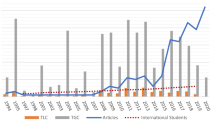Abstract
A theory of language may prove conducive to many important and complex issues in philosophy of education. After grouping these issues into four main categories, I explore the possibility and need to back up the categories with a comprehensive theory of language or a cluster of theories of compatible assumptions. I argue that Habermas's universal pragmatics can be presented as one such theory and explain why by reference to its conceptions of meaning and validity, while associating them with specific educational concerns and dilemmas. I suggest that, by breaking with representationalism and expressivism, universal pragmatics can help educational theory keep distances from positivism, performativity, and relativism.
Similar content being viewed by others
REFERENCES
Apel, K.-O. (1967). Analytic philosophy of language and the Geisteswissenschaften. Dordrecht, NL: D. Reidel.
Apel, K.-O. (1981). Charles S. Peirce: From pragmatism to pragmaticism.Amherst, MA: University of Massachusetts Press.
Austin, J.L. (1990). Philosophical papers.Oxford: Oxford University Press.
Blake, N., Smeyers, P., Smith, R., & Standish, P. (Eds.). (1998). Thinking again: Education after postmodernism.London, UK: Bergin & Garvey Press.
Blake, N. & Standish, P. (2000). Enquiries at the interface: Philosophical problems of online education.Oxford: Blackwell.
Brandom, R. (2000). Facts, norms, and normative facts: A reply to Habermas. European Journal of Philosophy, 8(3), 356–374.
Doddington, C. (2001). Entitled to speak: Talk in the classroom. Studies in Philosophy and Education, 20, 267–274.
Frank, M. (1989). What is neostructuralism? Minneapolis: University of Minnesota Press.
Frowe, I. (2001). Language and educational research. Journal of Philosophy of Education, 35(2), 175–187.
Goodrich, R.A. (1996). Analyticity, meaning, and education: A critique of a Quinean dogma. Educational Philosophy and Theory, 28(2), 27–41.
Grice, H.P. (1971). Utterer's meaning, sentence meaning, and wordmeaning. In J. Searle (Ed.), The philosophy of language (pp. 54–70). Oxford: Oxford University Press.
Habermas, J. (1984). Communication and the evolution of society.Cambridge: Polity Press.
Habermas, J. (1987a). The philosophical discourse of modernity.Cambridge, MA: MIT Press.
Habermas, J. (1987b). Knowledge and Human Interests. Cambridge: Polity Press.
Habermas, J. (1989). The theory of communicative action (Vol. 2). Cambridge: Polity Press.
Habermas, J. (1990). On the logic of the social sciences. Cambridge: Polity Press.
Habermas, J. (1991). Theory of communicative action (Vol. 1). Cambridge: Polity Press.
Habermas, J. (1992). Postmetaphysical thinking.Cambridge: Polity Press.
Habermas, J. (1994). Actions, speech acts, linguistically mediated interactions and the lifeworld. In G. Floistad (Ed.), Philosophical problems today (pp. 45–74). Dordrecht, NL: Kluwer. **
Habermas, J. (2000). From Kant to Hegel: On Robert Brandom's pragmatic philosophy of language. European Journal of Philosophy, 8(3), 322–355.
Ingram, D. (1994). Foucault and Habermas on the subject of reason. In G. Gutting (Ed.), The Cambridge companion to Foucault (pp. 215–262). Cambridge: Cambridge University Press.
Mackenzie, J. (2001). Christopher Winch on the representational theory of Language and its pedagogic relevance. Educational Philosophy and Theory, 33(1), 35–56.
Marshall, J.D. (1999). Performativity: Lyotard and Foucault through Searle and Austin. Studies in Philosophy and Education, 18, 309–317.
Noddings, N. (1996). On community. Educational Theory, 46(3), 245–267.
Norris, C. (1990). What's wrong with postmodernism.London: Harvester Wheatsheaf.
Norris, C. (1993). The truth about postmodernism. Oxford: Blackwell.
Papastephanou, M. (1997). Communicative action and philosophical foundations. Philosophy & Social Criticism, 23(4), 41–69.
Papastephanou, M. (2000). The idea of emancipation from a cosmopolitan point of view. Continental Philosophy Review, 33, 395–415.
Passmore, J. (1985). Recent philosophers. London: Duckworth.
Quine, W.V.O. (1953). Two dogmas of empiricism. In W.V.O. Quine (Ed.), From a logical point of view (pp. 20–47). Cambridge, MA: Harvard University Press.
Searle, J. (Ed.). (1971). The philosophy of language. Oxford: Oxford University Press.
Wellmer, A. (1992). What is a pragmatic theory of meaning? Variations on the proposition "We understand a speech act when we know what makes it acceptable." In Philosophical interventions in the unfinished project of enlightenment (pp. 171–220).
Winch, C. (1997). The representational theory of learning and its pedagogic relevance. Educational Philosophy and Theory, 29(2), 67–82.
Wittgenstein, L. (1958). Philosophical investigations. Oxford: Blackwell.
Wittgenstein, L. (1961). Tractatus. London: Routledge & Kegan Paul.
Author information
Authors and Affiliations
Rights and permissions
About this article
Cite this article
Papastephanou, M. On Language, Meaning, and Validity: Philosophy of Education and the Universal Pragmatics of Habermas. Interchange 35, 1–29 (2004). https://doi.org/10.1023/B:INCH.0000039019.67689.e5
Issue Date:
DOI: https://doi.org/10.1023/B:INCH.0000039019.67689.e5




